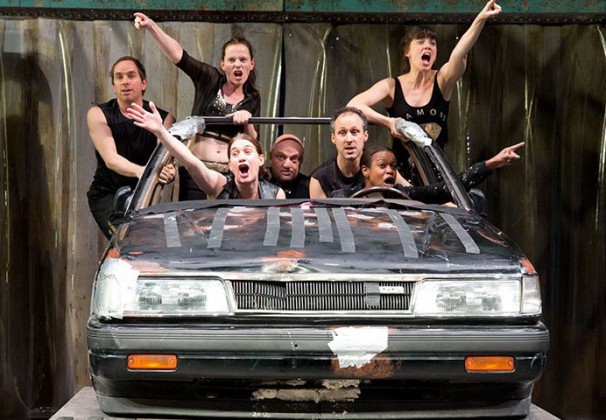
It’s impossible not to admire the ambition of the Anne Washburn-penned “Mr. Burns, a Post-Electric Play,” recently extended through Oct. 20 at Playwrights Horizons. With three acts, each taking place in a different time after a vaguely described travesty has wiped out most of the population, the play is pure dystopian drama, peppered with poignant satire of our pop culture-obsessed minds as the survivors clutch onto shared memories of “The Simpsons.” In all its ambition, however, “Burns” tangles its message up in a web of metaphors and moments of forced clarity that takes more from the audience than it gives.
We meet the protagonists, a group of once-strangers forced to become allies who are reciting and piecing together their memory of “Cape Feare,” a classic episode of “The Simpsons.” Sitting around the campfire, there is a naturalness in the way the actors treat this moment like an office watercooler discussion the day after a new episode of any modern popular series.
For a moment, the characters are pulled out of television daydreams when another survivor approaches the group. They come to realize he is not a threat and begin to inquire whether the newest member of the group had encountered any family, friends or acquaintances before meeting them. It’s a refreshingly human scene when tension and disappointment is broken, and they resume retelling the episode.
Using “The Simpsons” as a vehicle in this story is a great tool and a testament to the series’ endurance as a long-running cartoon on FOX. It would have been great if the play continued along this path — lengthy campfire discussion among strangers and survivors with moments of reflection and character development peeking beneath the surface.
But the play doesn’t stay that way. Instead, the second act leaps seven years into the future where the ensemble has become a theater troupe bargaining with other survivors for lost lines from “The Simpsons” episodes they can’t seem to remember. Re-enactments of episodes and commercials drag out under the fluorescent lights that drench the stage. As they brief the audience on the even more degenerated state of the post-apocalyptic world, the group’s dynamic crumbles and gives way to a hilarious but grasping medley of top 40 songs for the sake of their own nostalgia.
The shocking ending of act two leaves little to be understood before fast-forwarding 75 years and taking the audience into a twisted and metaphor-laden live-action version of “Cape Feare.” With Mr. Burns acting as a symbol of the destructive nature of nuclear power, the play morphs the characters, literally and figuratively, into nightmarish images and shadows of their existing template. It’s terrifying to watch but even more difficult to digest.
The final act can be interpreted a million different ways, which points out the main issue with the play — it assumes more than it can explain. Vagueness as a tool can be an exhilarating weapon in theater, but in “Burns,” it feels like a handicap that strains and exhausts an audience piecing together moments that are trying too hard to convey too many intentions.
A version of this article appeared in the Wednesday, Sept. 25 print edition. Brittany Spanos is a staff writer. Email her at [email protected].





















































































































































